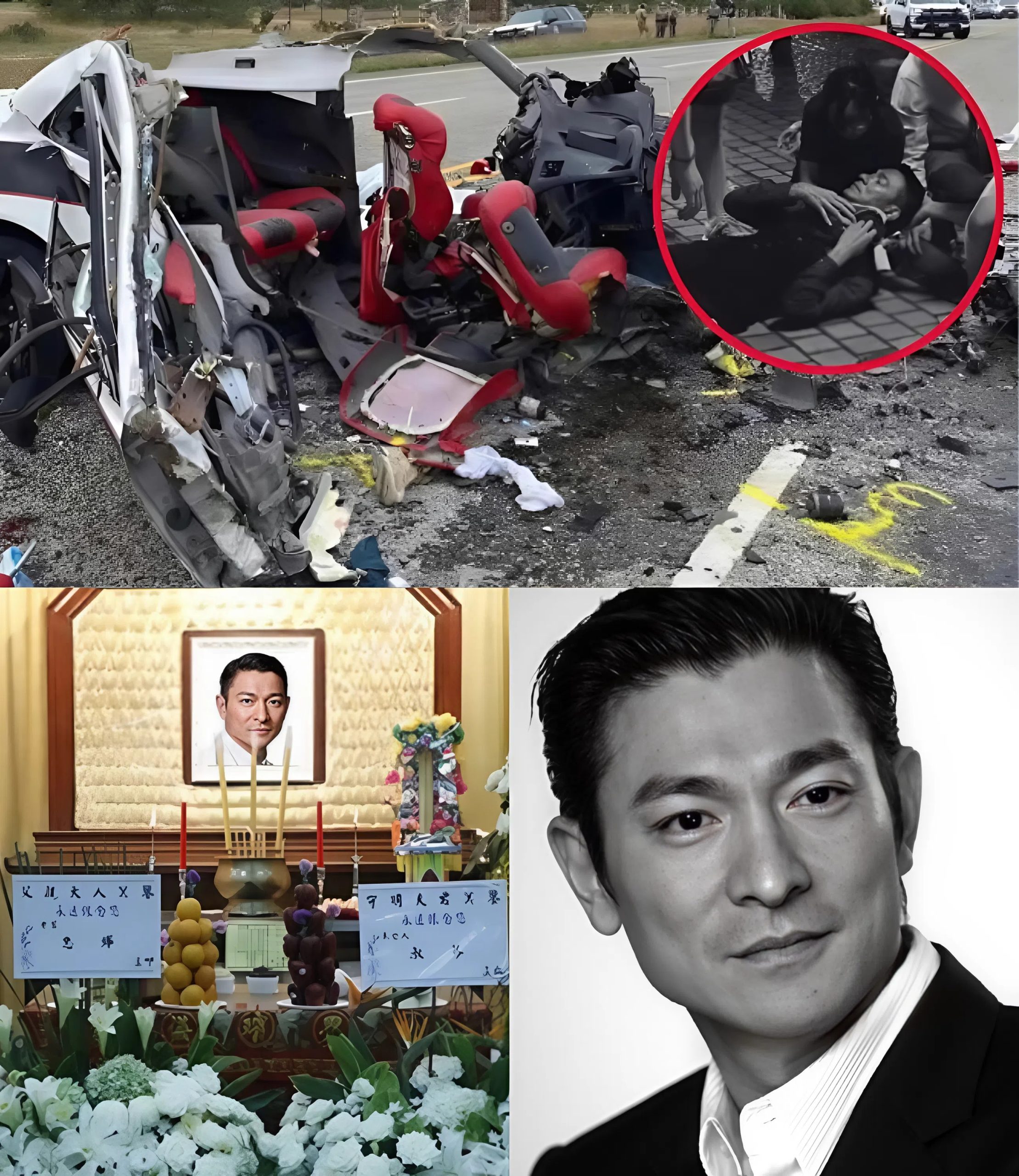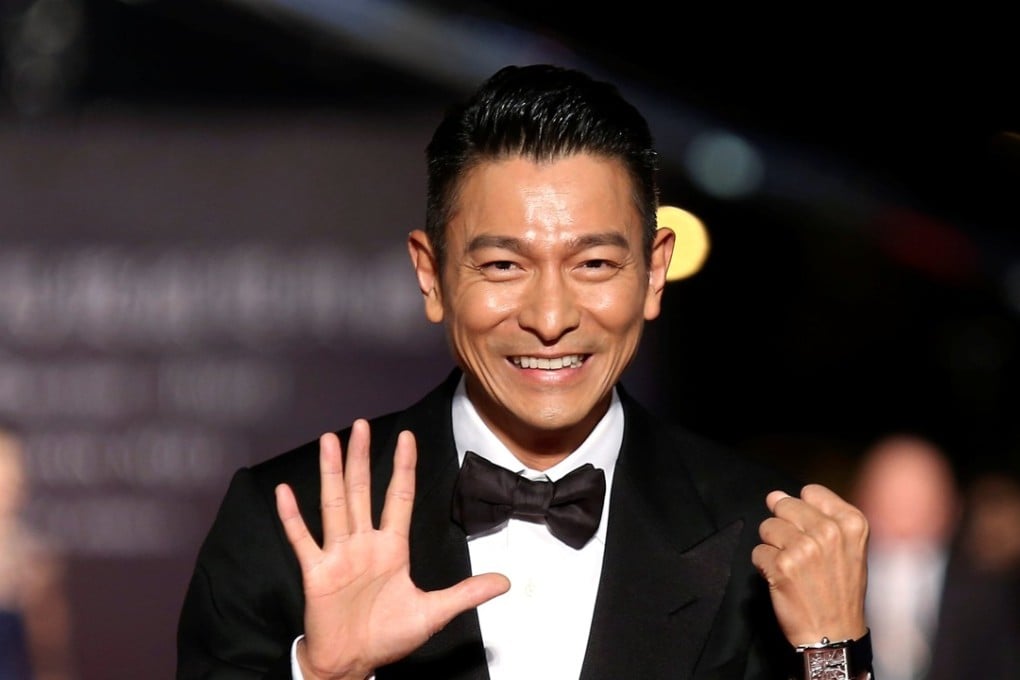For millions across Asia, Andy Lau Tak-wah is more than just a superstar — he is a living legend. He is a voice that defined decades, a face that symbolized Hong Kong’s golden age, and a presence that seemed eternal. But today, the myth surrounding one of the “Four Heavenly Kings” of Cantopop has cracked, leaving behind raw human vulnerability.
Only fifteen minutes ago, his wife, Carol Chu, broke her long silence to confirm what had until now existed only as whispers: Andy Lau has been fighting a serious, recurring illness over the past year. Her revelation, delivered in a trembling but composed statement, has shaken fans and media across the globe. What was once speculation has now become painful truth.
The news forces us to confront two realities simultaneously: the private suffering of a man adored by millions, and the cultural tremors felt whenever a larger-than-life icon suddenly appears fragile.

The Quiet Descent Behind the Spotlight
In public, Lau appeared tireless, even ageless. At sixty-three, he continued to sing with the same soaring tenor that captivated audiences in the 1980s, still took on demanding film roles, and still maintained his reputation as one of the hardest-working men in the industry.
But behind the glamour, insiders began noticing troubling gaps. Concerts were postponed, long-planned movie shoots quietly rescheduled. The explanation offered to fans was “rest” or “personal matters,” phrases that concealed the far harsher truth: Lau was moving in and out of hospitals, undergoing treatments that left him weakened, drained, and struggling.
According to those close to him, the disease is relentless — not a single catastrophic blow, but a recurring enemy that keeps returning, forcing Lau to endure pain and uncertainty in cycles. Each relapse reportedly brought with it crushing fatigue, physical weakness, and, most difficult of all, the knowledge that his family had to watch him suffer.
Carol Chu’s Rare, Emotional Intervention
Carol Chu, Lau’s wife of many years, has always stayed in the shadows. In an industry where celebrity spouses often court publicity, Chu cultivated silence and privacy, raising their daughter and serving as a quiet anchor in Lau’s otherwise storm-tossed life. Her breaking of that silence is therefore as telling as the message itself.
In her statement, she described Lau as “a man of extraordinary strength who has given his life to music, film, and his fans, but who is still human at the end of the day.” She admitted that the past year has been “the hardest season of our family’s lives,” marked by repeated hospital visits and the constant fear of relapse.
Her voice, described by reporters as both firm and tearful, underscored not just the severity of Lau’s condition but also a plea for compassion. “Please, let him fight in peace,” she urged. “And please remember that even heroes need rest.”
That final sentence — even heroes need rest — has already gone viral, quoted endlessly by fans who are struggling to reconcile the image of their indestructible idol with the frailty of his current reality.
The Cultural Shockwave
To understand the magnitude of this announcement, one must first understand Lau’s symbolic role in Chinese and Asian pop culture. Alongside Jacky Cheung, Leon Lai, and Aaron Kwok, he was crowned one of Hong Kong’s “Four Heavenly Kings” in the 1990s — a title that transformed singers into near-mythical figures.
For decades, Lau represented resilience, discipline, and loyalty. He released over a hundred albums, sold millions of records, and starred in more than 160 films, from action blockbusters to intimate dramas. He was a man of extraordinary versatility: equally at ease singing heartfelt ballads, performing electrifying stage shows, or portraying complex characters in Hong Kong cinema’s golden era.
Unlike many celebrities who bask in excess, Lau carefully cultivated an image of humility and tireless effort. He was the consummate professional, known for arriving on set early, memorizing not just his own lines but also those of his co-actors, and often working until exhaustion. In Hong Kong, he came to embody the ethic of hard work and perseverance — the idea that one could rise from humble beginnings to global stardom through sheer discipline.
This is why today’s revelation feels seismic. To see Lau — the very embodiment of invincibility — laid low by disease is to confront the fragility of the myths we build around our heroes.
Illness and the Hidden Lives of Stars
The Lau family has not revealed the exact nature of the illness, sparking a wave of speculation. Some suspect cancer, others suggest a degenerative condition or a rare autoimmune disease. Whatever the truth, what matters is the pattern: repeated relapses, mounting suffering, and the need for prolonged medical care.
In Asia, where public figures are often expected to maintain an image of stoicism, illness is rarely discussed openly. By acknowledging it, Lau and Chu have broken with cultural convention, inviting society to look more honestly at the human toll of relentless celebrity.
This revelation is not only about Andy Lau but about the broader pressures faced by stars who are celebrated for their endurance. For decades, Lau was the model of discipline, the star who never faltered. Yet even the strongest bodies reach their limits. His suffering underscores the hidden costs of a life lived perpetually in the public eye.
The Fans’ Response: Love, Shock, and Fear
Within minutes of the announcement, social media platforms exploded. Weibo, Instagram, and Twitter (X) were flooded with messages: prayers, memories, and promises of unwavering support. Old concert videos were reposted, with fans writing, “Get well soon, our Heavenly King.”
In Hong Kong, candlelight vigils have already been announced, and radio stations are replaying Lau’s most iconic ballads. Younger fans, who discovered him through films like Infernal Affairs — the precursor to Hollywood’s The Departed — have joined older generations in expressing grief and hope.
Perhaps most striking is the tone of the tributes. They are not just nostalgic but protective, as if millions now feel they must give back the strength that Lau once gave them.

A Moment of Reflection for Hong Kong and Beyond
This news arrives at a time when Hong Kong itself is grappling with questions of identity, change, and endurance. For many, Lau’s illness mirrors the vulnerability of a city that has weathered political, cultural, and economic storms. He is not just an entertainer but a metaphor for resilience — and seeing him falter hits close to home.
Cultural commentators argue that this moment could mark a turning point. Instead of demanding perfection from its icons, society might begin to embrace vulnerability, honesty, and the reality that even the strongest need care. Lau’s illness, painful as it is, may ultimately humanize him in a way that cements his legacy even further.
The Road Ahead: Uncertain but Not Alone
What lies ahead remains uncertain. Doctors are reportedly exploring aggressive treatment options, but relapses remain a risk. Some insiders suggest that Lau may never fully return to the relentless pace of concerts and filming.
Yet even if his public career slows, his influence will not diminish. His voice — whether in music, in cinema, or in the simple wisdom of his perseverance — will continue to resonate. Carol Chu captured this beautifully in her closing words: “Even when he cannot stand on stage, Andy’s spirit will always stand with you.”
That promise, fragile yet unbreakable, is perhaps the greatest gift Andy Lau has given: the assurance that his connection with his fans transcends illness, time, and even mortality.
Conclusion: A Hero Reimagined
The world today does not just see Andy Lau the superstar. It sees Andy Lau the man: a husband, a father, a patient fighting disease, and a cultural icon whose humanity is now laid bare.
The sadness of this revelation is undeniable. But within it lies something deeply powerful. By admitting vulnerability, Lau has given his fans a new kind of gift — a reminder that true strength lies not in appearing invincible, but in enduring suffering with dignity.
As the world prays for his recovery, one thing is certain: Andy Lau’s legacy has already transcended the stage. He has become not only a Heavenly King of Cantopop but also a symbol of courage, love, and humanity in the face of pain.
